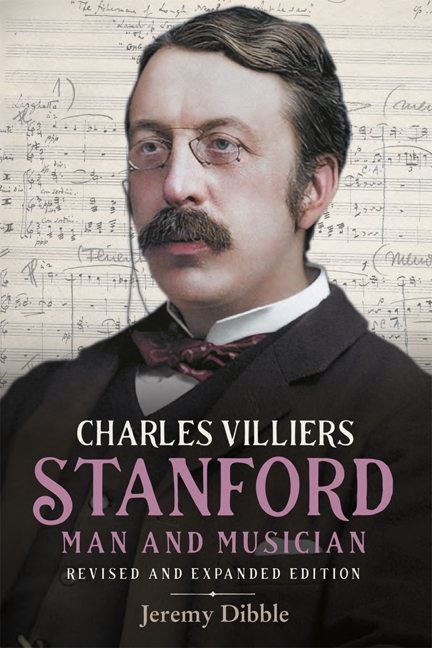Book contents
- Frontmatter
- Dedication
- Contents
- List of Illustrations
- List of Music Examples
- List of Analytical Tables
- Preface and Acknowledgements
- Supplementary Introduction to the Revised and Expanded Edition
- List of Sigla and Abbreviations
- I Early Influences and Impressions, 1852–70
- II Formative Years, 1870–87
- III Recognition, 1888–1901
- IV The New Generation, 1901–14
- V War and Decline, 1914–24
- Appendix: List of Works
- Select Bibliography
- Index of Works
- General Index
- Irish Musical Studies Previous volumes
7 - Removal from Cambridge, the CUMS Jubilee and the Focus of London (1892–5)
Published online by Cambridge University Press: 12 May 2024
- Frontmatter
- Dedication
- Contents
- List of Illustrations
- List of Music Examples
- List of Analytical Tables
- Preface and Acknowledgements
- Supplementary Introduction to the Revised and Expanded Edition
- List of Sigla and Abbreviations
- I Early Influences and Impressions, 1852–70
- II Formative Years, 1870–87
- III Recognition, 1888–1901
- IV The New Generation, 1901–14
- V War and Decline, 1914–24
- Appendix: List of Works
- Select Bibliography
- Index of Works
- General Index
- Irish Musical Studies Previous volumes
Summary
Even before tendering his resignation to Trinity College, Stanford had already been thinking about moving from Harvey Road. Commitments to the Bach Choir, the RCM, the Opera Class and proximity to the expanding musical life of Britain's capital made the acquisition of a house in London all the more imperative. A house at 55 Holland Street in Kensington (close to High Street, Kensington) was found which suited his needs perfectly. It had more room than his Cambridge dwelling, it was located in a desirable if expensive area and it was within easy reach of the College and the city centre. It was not possible, however, to move into Holland Street until February, so he and his family spent most of January at St Leonard’s, while he found temporary lodgings with Morton Lathom, a Bach Choir colleague, in Norfolk Street, Park Lane. Rehearsals for Becket were also gathering momentum and Stanford was keen to coach the singers and chorus, as he explained to Bram Stoker:
I forgot to ask you to get Miss G. Ward (Eleanor I believe) to look at the little song in Act I on which hinges nearly all the music so she must positively sing it even in a kind of humming way. I suggested in your absence John Sandbrook, formerly of the Royal College, for the baritone in the duet. I think we fixed on your former young lady in Henry VIII for the soprano. I shall be in town next Wednesday morning if I can be of any use let me know. I should vastly like (even with a piano only) to meet Miss Ward and show her the song, and if any way possible Miss Terry and show her the music to Rainbow stay that we may hit on the right declamation, also if possible the two singers. This would break the back of all the musical difficulties.
Stanford was, however, forced to forego the premiere of Becket at the Lyceum Theatre on 6 February 1893 owing to an obligation he had made to review the first performance of Verdi's Falstaff for The Daily Graphic and the Fortnightly Review. The opera was to be premiered on 9 February 1893 at La Scala, Milan, and the Stanfords were to be guests of the librettist, Arrigo Boïto, whom they had befriended during a stay with Piatti at Cadenabbia in 1889.
- Type
- Chapter
- Information
- Charles Villiers StanfordMan and Musician, pp. 284 - 320Publisher: Boydell & BrewerPrint publication year: 2024



